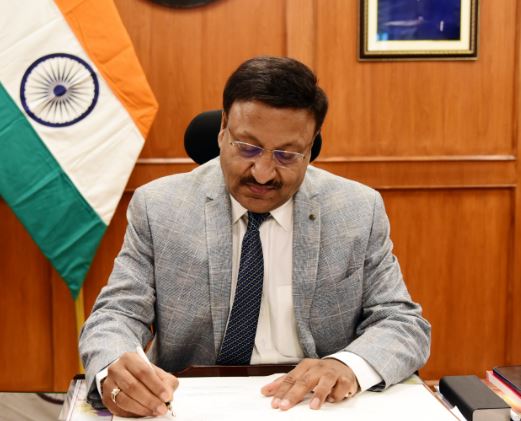Lucknow: The Election Commission of India Saturday directed all the district magistrates and superintendents of police to take strong action against officials, who are indulging in favouritism.
The poll body’s move comes in a bid to ensure “temptation free (prahlobhan-mukt)” Lok Sabha elections and provide a level-playing field to all the political parties.
Chief Election Commissioner Rajiv Kumar said that directions have been issued to all the DMs and SPs to ensure level playing field for all the political parties, and to take strong action against those officials indulging in favouritism.
“Ensure impartiality with junior officials working at cutting-edge level for level playing field. All the DEOs (District Election Officers) have been asked to immediately act on the complaint lodged by the political parties,” Kumar told reporters in Lucknow.
“At present, no complaint is pending and all the problems have been satisfactorily redressed,” he said.
Kumar, who was accompanied by Election Commissioner Arun Goel, also asked the officials to check cases of impersonation.
The chief election commissioner said that immediate action should be taken against people who are involved in fraudulent activities pertaining to the election process.
“SOP for defining the size of flag should be applicable equally to all. Counting of postal ballots should be held first. The movement of the EVMs should be in official vehicles,and the vehicles should be equipped with GPS tracking,” Kumar said.
“Timely delivery of EPIC and voter information slip should also be ensured,” he added.
The chief election commissioner also said that voters posted on election duty should cast their postal ballot at the voter facilitation centre.
“The names and numbers of the election observers should be made public so that it could be accessed by all,” Kumar said.
He added that a social media cell should be made at the district level for tackling fake news so that “false narratives are tackled immediately”.
The chief election commissioner (CEC) further said that targeted interventions are needed to increase the voting percentage.
Uttar Pradesh’s Chief Electoral Officer Navdeep Rinwa was also present on this occasion.
In his opening remarks, the chief election commissioner said, “Your state (Uttar Pradesh) is the most populous state, and the population of many countries is less than it. It has the most electorates and our efforts is that maximum voting should take place. We want to assure everyone that the elections will be held in a highly impartial and transparent manner, and we have made preparations that everyone gets a level-playing field. All the political parties should get equal opportunity, and there should not be any favouritism.”
He added that seven political parties — AAP, BJP, CPI, Congress, BSP, SP and Apna Dal met the Election Commission.
The CEC also said that some people had doubts over the EVMs.
“They (parties) were of the opinion that no one is opposing the EVMs, but were of the view that you should adopt such a means, which could generate some more trust (‘vishvaas’). Some of them were of the view that in order to stop apathy among urban voters, polling booths should be made in high-rise buildings as well,” Kumar said.
One of the slides pertaining to inducement free election mentions the “agencies to work in a co-ordinated approach rather than working in silos, and mapping of expenditure sensitive constituencies”, he added.
The chief election commissioner said the agencies are: State Police, State Excise department, Central GS and Customs, State GST, Directorate of Revenue Intelligence, Central Industrial Security Force, Income Tax Department, Enforcement, Bureau of Civil Aviation Security and State Transport department.
The other agencies are: Airports Authority of India, State Civil Aviation department, Postal department, Reserve Bank of India, State Level Bankers Committee, SSB, Special Enforcement Bureau, Railways and RPF and the Forest department, he added.
Elaborating about the directions given to the enforcement agencies, the chief election commissioner in one of the slides said that directions have been issued to take “strict action against use of money power during elections”.
“Dry up inflow and distribution of liquor, cash, freebies and drugs. SOP on checking of movement of illicit liquor and cash on inter-state borders. Action against liquor kingpins and strict monitoring on illegal online cash transfer through online wallet. The SLBC (State Level Bankers Committee) will transfer cash in designated vehicles and in designated hours,” Kumar added.
He also informed that as per demand from the candidates, up to four non-personalised cheque books with 50 leafs each will be provided by the banks on the same day.
Additionally, a personalised cheque book with 200 leafs will be provided within 4 days, he said.
The chief election commissioner said that instructions have also been issued to monitor air strips and helipads, identification of sensitive goods with high probable use for distribution, and strict vigil of warehouses and godowns for storage of liquor and free items.
On vigil on the inter-state and international borders, Kumar said that 30 districts of Uttar Pradesh share its border with nine states, adding seven districts share an international border with Nepal (555 km) and there are 99 check posts on the Nepal border.
In his presentation, he mentioned that there are 497 police inter-state check posts (including Nepal), 38 of the state excise and 31 of other departments. Uttar Pradesh’s Chief Electoral Officer Navdeep Rinwa was also present on this occasion.
The chief election commissioner was on a three-day tour to the state capital beginning February 29 to review the poll preparedness for the upcoming Lok Sabha elections.
PTI
